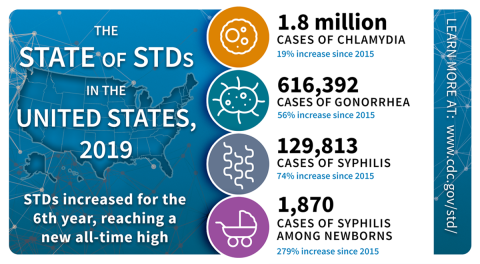Clark County Public Health STI Testing
Clark County Public Health provides free STI and HIV testing at our Harm Reduction Center and via at-home, self-test kits. Free testing is available for gonorrhea, chlamydia, syphilis, HIV and hepatitis C.
In-person testing
Clark County Public Health provides free in-person STI testing on Tuesdays from 9 am to 3 pm at our Harm Reduction Center located at 1010 Grand Blvd., Vancouver, WA 98661. Please submit the confidential form below to request an appointment.
Self-test kits
Clark County Public Health also offers free STI self-test kits. A free virtual telehealth visit with a public health nurse is required to determine appropriate testing. Please complete the confidential form below to request a free kit.
If you need help getting yourself or a partner treated for a STI, please reach out to our program at 564.397.8082. Our program phone is monitored 8 am to 5 pm Monday through Friday.
Additional testing and treatment resources
Most healthcare providers offer testing and care. If you do not have a provider or insurance that covers testing and treatment, please see the list below for more resources:
- Cascade AIDS Project (CAP) provides testing on Tuesdays and Thursdays. They do not provide STI treatment.
- Planned Parenthood
- Sea Mar Community Health (all locations). Sea Mar Salmon Creek has a specific program focused on STI/HIV testing and care.
- HIV Test Services
- Options 360 (Women only)
- Additional resources are listed here.
Court-ordered HIV testing
Your healthcare provider can provide you with an HIV test. You may also use the additional testing and treatment resources listed on this page to obtain an HIV test.
If none of those options work for you, please call 564.397.8082.
What are STI's?
Sexually transmitted diseases (STDs), also known as sexually transmitted infections (STIs), are very common. Millions of new infections occur every year in the United States.
STIs are passed from one person to another through sexual activity including vaginal, oral, and anal sex. They can also be
passed from one person to another through intimate physical contact, though this is not very common.
STIs don’t always cause symptoms or may only cause mild symptoms, so it is possible to have an infection and not know it. That is why it is important to get tested if you are having sex. If you are diagnosed with an STI, know that all can be treated with medicine and some can be cured entirely.
STIs are preventable. If you have sex, know how to protect yourself and your sexual partners from STIs.
Visit the Centers for Disease Control and Prevention to learn more about STIs, HIV, and Hepatitis.
HIV treatment and prevention
People with HIV should take medicine to treat HIV as soon as possible. If taken as prescribed, HIV medicine reduces the amount of HIV in the body (viral load) to a very low level, which keeps the immune system working and prevents illness. HIV medicine can even make the viral load so low that a test can’t detect it. This is called an undetectable viral load.
Getting and keeping an undetectable viral load is the best thing people with HIV can do to stay healthy. Another benefit of reducing the amount of virus in the body is that it helps prevent transmission to others. This is sometimes referred to as treatment as prevention.
